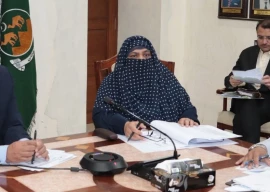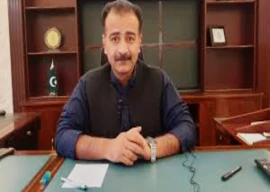
Authored by Justice Jawwad S Khawaja, one of the judges of a bench that turned down the prime minister’s intra-court appeal on February 10, a detailed verdict also warned, ominously for the premier, that it would not practice restraint in the name of ‘serious consequences’ or ‘functional immunity’. It stated that a seven-member trial bench will examine contempt of court charges against the prime minister in depth.
The rationale for the rejection of the appeal is stated to be the premier’s constant inaction in implementing its order over the National Reconciliation Ordinance (NRO) – that is, to write a letter to Swiss authorities seeking reopening of graft cases against President Asif Ali Zardari.
The court termed Prime Minister Gilani’s appeal to receive preferential treatment contrary to the Constitution as well as Islamic teachings. The premier had filed an appeal through his counsel Aitzaz Ahsan against a preliminary Feb 2 order that decided charges against the prime minister would be framed for the non-implementation of the NRO verdict.
The judgment indicated the bench was in no mood for excuses, reminding premier Gilani of his oath to protect and work in accordance with the Constitution, saying that “the higher the constitutional office, the greater the onus of responsibility on the holder of such office … In other words, the court has greater reason to be particularly concerned about the possibility of contempt having been committed by the appellant.”
Is special privilege fair?
The verdict went on to state: “It is clear to us that the appellant’s (premier’s) claim to a ‘special privilege’ on account of his executive office, which seeks for him ‘greater restraint’ amounting to an exception from contempt proceedings, does not find any basis in our Constitution”.
The judgment quoted a Hadith in the verdict as well: “O people, those before you were ruined because when someone of high rank among them (sharif) committed theft, they would spare him, but when a weak person from amongst them (zaeef) committed theft, they would inflict the prescribed punishment upon him.”
Replying to Aitzaz’s concerns, the court order stated: “…the court cannot and should not base its decisions on expediency or on consideration of the consequences which may follow as a result of enforcing the Constitution… the doctrine of necessity has already been buried because of the valiant struggle of the people of Pakistan. The court can only strengthen the rule of law by upholding the Constitution, which is, in fact, the supreme law.” The doctrine of necessity refers to the basis on which extra-legal actions designed to restore order are found to be constitutional.
Explaining why the court refused to dismiss the show-cause notice against the prime minister (a notice requiring one or more of the parties to a case to justify, explain, or prove something to the court) the judgment says, “A show-cause notice under the (contempt of court) ordinance can, of course, be discharged where the alleged contemnor shows that the court order has, in fact, already been complied with. The notice may, at the discretion of the court, also be discharged if the alleged contemnor agrees to comply with the court order even after the issuance of a show cause notice.”
The court observed that the prime minister’s explanations to rely on the advice of his subordinates’ summaries confirm that the directives in the NRO judgment have not, as yet, been complied with.
The court also found incorrect the defence counsel’s contention that the trial bench denied him a ‘full hearing’.
To review the full text of the verdict
visit: https://i1.tribune.com.pk/?p=345919
Published in The Express Tribune, March 6th, 2012.
COMMENTS (28)
Comments are moderated and generally will be posted if they are on-topic and not abusive.
For more information, please see our Comments FAQ

















@syed Imran: Truth is bitter. When there is no argument, some come down to personal attacks. Can you please be polite enough to quote what is wrong that I have said? Or you just felt like name calling? I only talk about principles, values and truth nothing personal. If the shoe fits it is not my fault. Regards, Mirza
@Umer: May I add that even to function, the Punjab government relies on the funds from Sindh (Tax collected from Karachi). How much tax Punjabi businessmen/real state tycoons, landlords give? Peanuts! Without other provinces, "Northern Punjab" is doomed to fall due to huge population and no resources.
Once a woman brought a claim against the Caliph 'Umar. When 'Umar appeared on trial before the judge, the judge stood up as a sign of respect toward him. 'Umar reprimanded him, saying, "This is the first act of injustice you did to this woman!"
@umair:
Really? How many days Punjab will survive without gas from Sindh, Baluchistan, and PKP? How much Import/Export can Punjab do without the ports? Two weeks maximum and Punjab goes bust and millions in Punjab unemployed. Punjab is taking all the resources from provinces, yet gives all the high ranking jobs to itself. Then, as expected, prosecutes only those of smaller ethnicities and yet doesn’t consider it discrimination of any kind. What a joke.
And now what?? This is all a big drama, nothing is going to come out of it
@zubair khan: "@Umer: Its cause of people like you that Pakistanis can never be one!"
If being one means blindly following Northern Punjab's lead, then sorry the people of other provinces refuse. It is time that Northern Punjab should start going along with the rest of the Pakistan.
@Umer: Ask this question to your Feudal Lords, who always cry for royalties not for their people.
And be thankful to Punjab as it maintains special quota for Balochis.
@ Mirza shut your mouth. You have no right to abuse the court.
I wish you disclose your real identity and I will take you the court on this
bakwas
But still the Court will never punish him. Look at the time given to him. CJ sahib we the citizens of this country are very very frustrated at the long delays in your decision making. *Tell us something about the Rental Power Case,when are announcing the decision*
In this game of blaming and accusation by using the delaying tactics in contempt of court case only the nation is being fooled and deceived and thus by giving the dates in this regard the present government shall complete its tenure and the game shall over.And the nation's especially common and poor man's problems and difficulties shall remain in the same conditions even shall increase.
@umer Let's abolish all criminal proceedings against the seraiki, Balochi, Pathan, Sindhi, mohajir etc because apparently no one is punjabi. What rubbish!
@Umer: Its cause of people like you that Pakistanis can never be one!
@blithe:
Why are there no judges from other provinces? Is it Supreme Court of Pakistan or Supreme Court of Punjab?
I have no issues with the contempt of court proceedings. But this court is surely bringing out a mullah side which could be ominous
@Umer: Kindly don't play petty provincial politics here. He was supposed to write a letter to Switzerland to open the case of the dollars lying in the swiss account. He needs to be punished for not following the Supreme Court - it has nothing to with him playing the 'political' Seriki card.
Throughout the history of Pakistan, the attitude of the judges has been contemptuous towards the people of Pakistan. Yet they continued to operate with complete impunity and self-righteousness. The current lot is no different.
"The judgment remind the prime minister of his oath to protect and work in accordance with the constitution, saying that “the higher the constitutional office, the greater the onus of responsibility on the holder of such office". Are these the words of same PCO SC which is still working under Mush's PCO not the 1973 constitution? Are these not the same judges who have endorsed Mush's overthrow of elected govt and mutilation of constitution? This greater onus is only on elected PM, the paid govt servants including generals and SC judges are exempt from that.
Gialni, stop playing Serikistan politics and resign before you are declared to be in contempt of court and have to be forced out.
SC is wasting time of public, she should immediately indict him. What is the reason of delaying to the moment when it becomes useless? I wish SC would have done the same with other criminals as well.
Well done Justice Jawwad Khawaja and other Lordships. Well argued and reasoned Judgment that ought to set the record straight for the PM and his illustrious counsel, who doesn't play marbles without profit. In any civilized country one would see the PM resign and depart in shame. But after the Senate elections with representation all stacked up in favor of the PPP, and those in their pockets - including the Friendly Opposition - there is no conscience or anything like it to do the right thing in the Land of the Pure.
I thought he had no problem going to jail and he wanted to die a shaheedand bla bla. All those big words and then a request for special treatment
Bravo SC.
A breath of fresh air coming out of this ruling, and hopefully the court will enforce it in the future when an adventurist from Rawalpindi try to test the doctrine of necessity again.
"What happens to an individual is of little consequence as long as State institutions continue functioning in accordance with the Constitution. The anachronistic notion of “après moi, le déluge” has no room in a Constitutional system"-excerpted from the ruling.
Just read the detailed verdict and it left me awestruck. Gilani and Aitzaz should read the verdict in its entirety and if Gilani has any shame, he should resign or follow the court orders. It is just shameful that in his plea, he demands special privilege due to his Executive office and asks for greater restraint for the sake of democracy. Sick and tired of this democracy mantra, it is high time that PPP come up with a new slogan or a sales pitch. Hats off to the Supreme Court for its bold stand and resolve to enforce the law. I hope the Supreme Court succeeds and brings back these 'special' people back to their auqat.
Well done SC, at least someone is speaking up for the people of Pakistan.
Fit!
Main reason is SC is mainly Punjabi and PM is Siraiki.